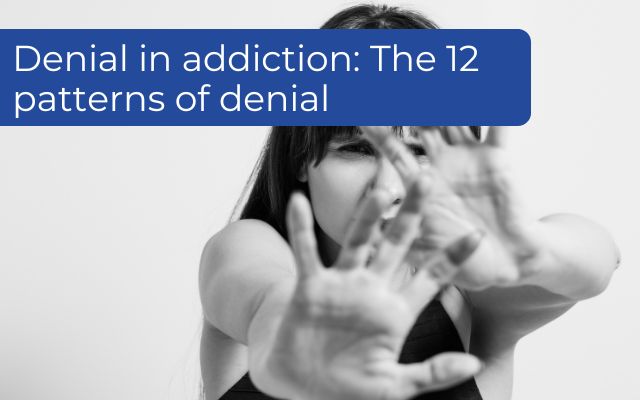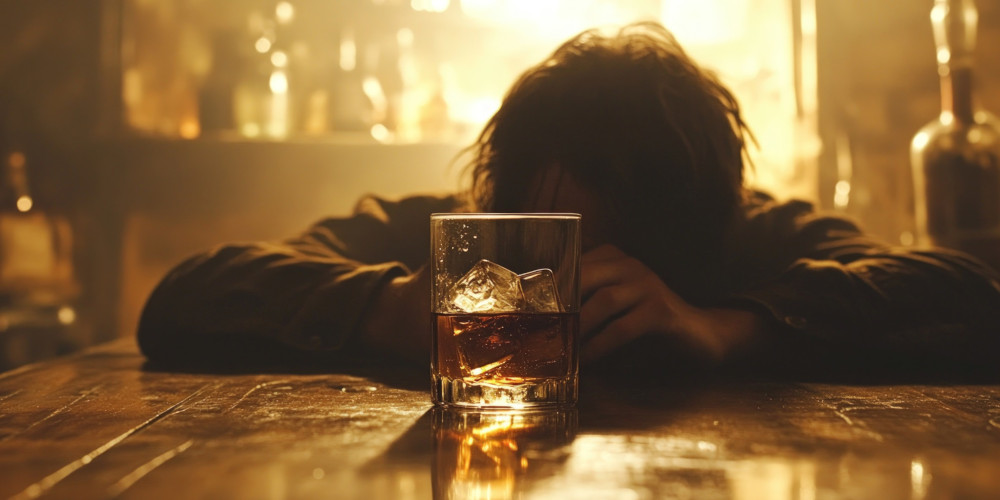To recover from addiction, it is incredibly important to be able to identify denial. The 12 patterns of denial were developed by international addiction expert Terence Gorski to do just that.
Read more about the 12 patterns of denial below:
- Denial & Avoidance
- Absolute Denial
- Denial & Minimising
- Denial & Rationalising
- Denial & Blaming
- Denial & Comparing
- Denial & Compliance
- Denial & Manipulation
- Denial & Flight Into Health
- Denial & Strategic Hopelessness
- The Democratic Disease State
Denial in addiction is rife and the two often go hand-in-hand. Addicts and alcoholics often need a level of denial to carry on justifying their using and drinking to themselves as well as to everyone else. As such, denial in addiction often works subconsciously which is why becoming aware of denial patterns – and then dismantling them – is so important in addiction treatment.
A popular acronym for denial is Don’t Even Know I Am Lying.
Are you in denial? We will help you answer this question by explaining the 12 patterns of denial using the example of John who is a 28-year-old alcoholic who was recently admitted to a rehab in Joburg.
For a bit of background, John has been drinking for the last decade but his addiction progressed to dangerous levels in the past four years. He has been taken to the emergency room multiple times for alcohol poisoning and for injuries sustained while drunk. His wife divorced him a year ago because of his aggressive behaviour while drunk. John binge drinks from Thursday to Monday and, upon entering treatment, was convinced he was simply a social drinker and not an alcoholic. This is despite the fact that once he has one drink, he is unable to stop as well as the fact that he has tried to quit multiple times by himself without success.
If you look at the definition of addiction – which is the continued and compulsive use of substances despite negative consequences – then John is most certainly an addict.

The 12 Patterns of Denial
1. Avoidance
“I’ll talk about anything but my real problems”
This is denial by omission. When John was in rehabilitation treatment, he would talk about his career in business, about all his accolades, about his family, about his divorce, about absolutely everything except his problem with alcohol.
- Read more about Avoidance
2. Absolute Denial
“No, not me! I don’t have a problem”
In the beginning of treatment, John point-blank refused to admit he was an alcoholic. Despite all the evidence of how alcohol had come to control his life, and his every decision, he refused to even entertain the idea. He was in treatment after having been caught drunk at work, yet his denial was so thick in those first few days, he refused to introduce himself as an alcoholic.
- Read more about Absolute Denial
3. Minimising
My problems aren’t that bad”
After some therapy in treatment, John came to tentatively accept he had a problem with alcohol. But he told his counsellor that it really wasn’t so bad. He didn’t drink every single day. He hadn’t lost his job. He was still functional. It was only alcohol, and not other drugs. And alcohol is legal anyway. He claimed that, while he had a problem, it wasn’t significant enough to warrant him having to go to rehab.
- Read more about Minimising
4. Rationalising
“If I can find a good enough reasons for my problems, I won’t have to deal with them”
His drinking only got heavy when he started encountering stress at work. Alcohol was the only thing that could help him de-stress, so he said.
- Read more about Rationalising
5. Blaming
“If I can prove that my problems are not my fault, I won’t have to deal with them”
John said that he used alcohol to cope with his past divorce as well as for depression. He was also abused as a child and his parents didn’t stop this abuse. He felt as though these were big enough reasons to push him to lean on alcohol. They weren’t his fault, therefore turning to drinking wasn’t his fault. He asked: Why must he be punished for the trauma of his past? Because of these problems, he ‘deserved’ to have a drink to unwind.
- Read more about Blaming

6. Comparing
“Showing that others are worse than me, proves that I don’t have serious problems”
John’s older sister is 10 years clean from heroin. When she was using drugs she spent some time on the street after countless stints in rehab. She eventually made a decision to choose recovery and has never looked back. Throughout John’s drinking career he compared his addiction to hers and always came out thinking: Compared to her, his problems are nothing! He didn’t use drugs, he didn’t inject, he hasn’t gone to rehab multiple times, he didn’t end up on the street. His counsellor’s warned him: This is only a matter of “yet”. He hadn’t lost his job, his house, his car, his brain, his health, his life – YET.
- Read more about Comparing
7. Compliance
“I’ll pretend to do what you want, if you’ll leave me alone”
After a couple of weeks in treatment, John figured that resistance was futile. He started following the rules but not because he wanted to or believed in them, he just wanted his peers and counsellors ‘off his back’. He shared about his problem but only told 25% of the story and left out some important information and experiences. This only served to delay his progress towards recovery, not hasten his way through treatment.
One needs to delve deeply into themselves to honestly start to heal and enter recovery. He also agreed to follow a 12-step programme when he left treatment, as well as agreeing to pay back money he stole to feed his addiction, when he had no real intention of doing so.
This is a particularly difficult pattern of denial because the addict or alcoholic often even convinces themselves that they are doing the right thing for the right reasons when they are not.
- Read more about Compliance
8. Manipulation
“I’ll only admit that I have problems if you agree to solve them for me”
Eventually, John began to get honest about his problem with his counsellor. However, he did so expecting his counsellor to do the work for him and to give him an easy guide to recovery. He did not want to do the mental and emotional work of facing his problem and starting his process of recovery. For example, he refused to do stepwork: Written work designed to help addicts become more self-aware, break their denial and start to change their unhealthy thoughts and behaviours.
He also only shared information with his counsellor that he thought would get him through treatment more quickly. For example, he exaggerated his progress in truly admitting he was an alcoholic. He repeated phrases he learnt from his peers in order to convince his counsellor that he was actively trying to face his problem as well as his denial.
- Read more about Manipulation
9. Flight Into Health
“Feeling better means that I’m cured”
After a couple of weeks of sobriety in treatment, John began to feel much better both physically and mentally. Regular meals and sleep restored his body and he began to gain weight. His mind also began to feel clearer – without the influence of alcohol as well as the constant obsession about drinking. He thought that, because of this, he was cured. He believed that his restored health meant he no longer had a problem. It is common for addicts to forget the severity of their problem after some time in sobriety as they begin to recovery physically and mentally because their brains and bodies start to heal.
- Read more about Flight Into health
10. Recovery by Fear
“Being scared of my problems will make them go away”
When John came into treatment, he received a full evaluation from a medical doctor and underwent a battery of tests. The doctor told him he done serious damage to his liver and would be at risk of liver failure if he returned to using alcohol. He was also told he was at risk of ‘wet brain’ – a kind of brain damage from alcohol – if he continued to drink. This came as a shock and instilled some fear in him about his problem.
He convinced himself that this fear would keep him sober. When he left treatment, he did not follow a 12-step recovery programme as recommended and relied on this fear to prevent him from relapsing. But this only kept him sober for a couple of months and he eventually started drinking again. Without following a strong recovery programme, relapse is inevitable. Addiction is a brain disease that is stronger than fear.
- Read more about Recovery by Fear

11. Strategic Hopelessness
“Since nothing works, I don’t even have to try”
John kept relapsing and returned to rehab three times last year. He began to think his was a hopeless case. He convinced himself of this ‘hopelessness’. During his third stint in treatment, he told his counsellor that he was simply not meant for recovery and that rehab didn’t work for him in the past, why would it work for him this time? His counsellor reminded him that his sister is in recovery after many more times in treatment: Treatment can work as long as you do the work.
His counsellor reminded him that all he needs to do is make a decision to be in recovery and continue to work a recovery programme. No-one is a lost cause. Anyone can ‘get’ recovery as long as they make a decision and do the work. Telling yourself that you are a ‘hopeless case’ is simply giving yourself a continued licence to use or drink and abdicate taking responsibility for your problem.
- Read more about Strategic Hopelessness
12. The Democratic Disease State
“I have the right to destroy myself and no one has the right to stop me”
‘Stuff you, it’s my life!’ – These were John’s words when his family tried to intervene and send him back to treatment after his first relapse. He eventually lost his job and could no longer pay his wife maintenance for his children. He wanted people to leave him alone and allow him to slowly commit suicide through his drinking. While continuing to drink is his choice, he mistakenly thought that his drinking affected him alone.
Everyone around the addict is affected by their addiction. Continuing to use or drink, and thinking it is your right to do so, is a reflection of the selfish nature of addiction. John’s wife and children were negatively affected by his drinking. But they were also positively impacted when he did decide to get sober and follow a programme of recovery. As a result of recovery, he could support his family financially once again as well as be a present father to his kids.
- Read more about The Democratic Disease State
Do any of the above patterns of behaviour sound familiar? If yes, you are probably in denial. As they say: Denial isn’t just a river in Egypt. It is a serious problem that needs to be faced in order to successfully recover from addiction. The longer you take to overcome your denial, the longer it will take you to get clean and sober and experience the gifts of recovery.
Takeaway: Acceptance means facing your denial and is the first step in achieving a sustained recovery.
Are you ready to get help with your denial? Contact us today.


